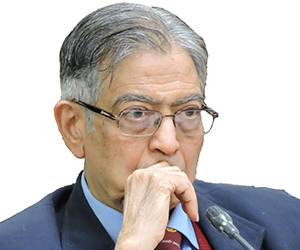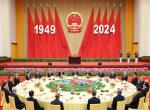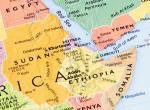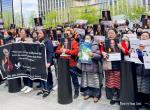The recent CNN-IBN interview of Mr M.K. Narayanan, the national security adviser (NSA), in defence of the government's assertions on Pakistan-sponsored terrorism, including the setting up of the anti terrorism mechanism, has added to the widespread belief that the government has lost its way on how to handle it. The interview was quite obviously given in response to serious misgivings aroused by the statements in the wake of the Manmohan Singh-Musharraf Havana meeting. Following this meeting PM echoed the US-Pak argument that Pakistan is a "victim" of terrorism, and the then foreign secretary (designate) asserted, in an attempt to justify Musharraf s untenable claim that there were "freelance" terrorists operating out of Pakistan, that India should distinguish between the actions of Pakistan based terrorist groups and those of the Pakistan government.
It may, at the outset, be mentioned that there is a contradiction between the NSA's assertion that the PM sees Pakistani induced terrorism "as India's biggest problem," and his contention that he wishes to avoid "finger pointing towards Pakistan." Surely, finger pointing is the very least we can do in addressing our biggest problem irrespective of whether or not it results in a "slanging match." Our leadership is guilty of letting the home team down by fighting shy of openly and directly drawing attention to Pakistan's involvement in terrorist activity directed against India. Such a squeamish approach will have the following adverse consequences:
- Firstly, it will cast a shroud over the magnitude of Pakistan's involvement in terrorist activities directed against India.
- Secondly, it will weaken India's capabilities in dealing with Pakistan by confusing our people and undermining the commitment and morale of our security and intelligence agencies.
- Thirdly, it will send a message to the international community that India is not overly concerned about Pakistan's role in the promotion of terror in the country and that, accordingly, there is no need to pressurise Pakistan in the matter.
The NSA would have us believe that the recent Havana initiatives should not be taken to mean that the government is "naive" or "weak." This is hard to accept. The tectonic shift in our traditional policy of openly confronting Pakistan on terrorism, which had led to sensitising the international community about the dangers of Pakistan sponsored terrorism, is standing testimony to government's pusillanimity. While in part dictated by distaste of getting into a "slanging match," the recent policy change has evidently been taken to fall in line with US policies of condoning Pakistan sponsored terrorism against Afghanistan and India, in order to provide comfort to Musharraf. Nobody can have any illusions about the fact that the proposed anti terrorism mechanism will be used to dispute, deflect and deny our allegations, thereby delaying and avoiding meaningful action on our assertions about Pakistan sponsored terrorism.
The NSA has gone on to suggest that by terming Pakistan as a "victim of terror" PM was not equating it with India. Since India is also a victim of terror what else is this but not equating the two countries?
Similarly, his defence of the foreign secretary's reported assertion that India must distinguish between terrorist elements in Pakistan and the government of Pakistan on the grounds that he "would be called upon to produce the evidence" is untenable. Anyone who knows anything about Pakistan is aware of the extent to which its government controls terrorist activities directed against India. There is, moreover, no dearth of evidence to substantiate this.
The NSA's justification of the anti terrorism mechanism as an "opportunity" to enable Pakistan to "prove in deeds what they have said in words" makes little sense. If Pakistan were sincere in addressing terror, India would instantly know it through a palpable decline in terrorism in the country. Pakistan's failure to shut down the infrastructure of terror and refusal to hand over those involved in terrorist activities directed against India, like Masood Azhar, Dawood Ibrahim, Salahud-din etc, are further proof of its mala fides. Given Pakistan's inimical attitude towards India, nothing good will come out of the anti terrorism mechanism. In fact, it will be counterproductive. The sharing of intelligence and evidence will enable Pakistan to get a better insight into our intelligence and security related capabilities, which it will use to its advantage. Such sharing will also help identify the sources of Indian agencies which Pakistan will try to silence, thereby affecting the future flow of intelligence.
It is regrettable that the con tours of the anti terrorism mechanism have not been fully thought through. So sensitive an arrangement should only have been embarked upon with complete clarity about its precise nature and manner of functioning. In this context, the NSA, while asserting that there would be no intelligence sharing under the proposed mechanism, goes on to state that India would provide evidence to Pakistan on terrorist incidents in India inclusive of "specific locations, specific names, specific telephones." There is a contradiction in this, because the evidence is in itself of immense intelligence value as it reveals not only what we have been able to gather but also the gaps in our intelligence gathering capability.
Worse still, while talking of the anti terrorism mechanism, the NSA has clearly signalled our laidback approach in addressing Pakistan's involvement in terrorist activities directed against India. He thus declared that India was not prepared to engage in "hot pursuit and that kind of stuff' and went on to suggest that India was giving Pakistan a long rope and would be happy if Pakistan delivered "on some" of the evidence furnished to it. This will only encourage Pakistan to continue with terrorism as usual against India,
confident that the latter will not take any serious punitive measures against it.
Not only has the government got itself in a bind on the anti terrorism mechanism, but it finds itself unable to even take a clear and consistent line on the quality of evidence that it has collected on the Mumbai train blasts. While the NSA claimed that he would hesitate to say that we have "clinching evidence" about Pakistani involvement in the 7/11 Mumbai blasts, the home secretary proclaimed we have "solid evidence," and the PM said we have "credible evidence." Given this confusion, Musharraf must be having a good laugh at the confusion that now prevails in New Delhi. The NSA's assertion has, moreover, provided Pakistan with an excellent opportunity to rubbish India's case against it on the Mumbai train blasts. /The Pakistani spokesperson instantly welcomed the NSA's assertion and declared that it was "a lesson which must be learnt by Indian agencies and security forces that they should not blame Pakistan without evidence.
Washington must be happy that New Delhi is not only faithfully toeing its line but has also been unable to get its act together in dealing with its favourite military ruler.
It would be fitting to conclude by citing the advice offered in the columns of The Asian Age of May 12, 1997 by no less a person than Mr M.K. Narayanan, the present NSA, to the effect that, "Diplomatic skills would again be needed to convince the US still further of the danger of turning a Nelson's eye to Pakistan's role as a hub of terrorism. There is enough evidence with the US about Pakistan's efforts to support the militants and ultras in the Kashmir Valley, but this may now have to be brought to fruition by ensuring that sanctions are imposed on Pakistan for exporting terrorism."
It is hoped that we will not turn a Nelson's eye to this advice, which has even more validity today, given the increased threat to us from terrorism and our strategic partnership with the US on which such great expectations are placed by our leadership.
Ajit Doval is Former Director of the Intelligence Bureau
Satish Chandra is Former diplomat and India's former high commissioner to Islamabad and Former Deputy NSA
Published in Asian Age on 29 Oct. 2006










Post new comment